Podcast: Entrepreneurship Episodes
8.9% of military Veterans self-identify as an Entrepreneur after their military service. Entrepreneurship can take on many forms, and the highlighted episodes below showcase several different forms of startups. This includes technology startups, franchises, consulting startups, and more.
Additional Episodes:
This is part two of a book review of Four Thousand Weeks: Time Management for Mortals by Oliver Burkeman.
I've read a lot of books on productivity, and this is by far one of the best I've read. Because it takes a completely different approach to our view of time and how to get things done.
I recently read a book that I love: Four Thousand Weeks: Time Management for Mortals by Oliver Burkeman.
I've read a lot of books on productivity, and this is by far one of the best I've read. Because it takes a completely different approach to our view of time and how to get things done.
In this episode, I go through a tactical list he includes in the book about 10 Tools for Embracing Your Finitude. I hope this helps you as much as it helped me.
I've interviewed 510+ top performers. Here are five characteristics I've seen them share:
1. Readers
2. Mentors
3. BIG goals
4. Get out of doing
5. Active
Ryan is a case study in being proactive, intentional, and open to feedback. He shares some crazy stories about how his side hustles (6+) led to his eventual founding of Gridwise, which has raised over $20M in funding to date. Whether or not you're interested in entrepreneurship, you'll benefit from Ryan's story.
Why Listen:
2 years after our initial conversation, Herb Thompson is back on Beyond the Uniform. In this conversation, we talk about topics including:
What LinkedIn is and isn't
How Herb wrote his first book in a single weekend
How companies leveraging Veterans are improving their bottom line, not doing charity
How to own your journey
Building a bridge rather than a wall
How Veterans gaining employment and success helps us all
How important it is to believe you belong
Why Herb chose to stand in front of 60,000 people, even though it made him uncomfortable
Why it's important to not do anything alone
You can (and should) follow Herb Thompson on LinkedIn here: https://www.linkedin.com/in/herb-thompson-sf2biz/
Why Listen:
I found the modern incarnation of Alexander Hamilton. This must be what Dr. Dre felt like when he discovered Eminem. He’ll be interviewed by Tim Ferriss one day, but know that his warm-up was with @Beyond the Uniform.
Michael Muir and I connected via a LinkedIn post. We chatted for 20 minutes, and I knew I had to interview him.
Here’s what you should know about Michael:
- He spent much of his childhood homeless or in foster homes
- He left a full ride to the University of Wisconsin to follow his intuition
- He joined the Marines
- He went to Brown
- He joined Bain & Company
- He works at SVB
- He’s interned at places including HBO, Google, and Deloitte
If I had this story, you couldn’t get me to shut up about it. But despite his incredible accomplishments, Michael is humble, introspective, and honest.
Had I been dealt the same set of cards as Michael, I’m not sure where it would have ended up. But I have a strong suspicion it wouldn’t be Brown, Bain, or SVB.
I hope you enjoy this interview with Michael Muir.
Someone in our community sent me a message requesting a few thoughts on their military career transition. I wanted to take the opportunity to share four things that have been on my mind lately.
Matt Miller is the President and Founder of School Spirit Vending, a Hassle-Free, Year-Round Fundraising company for Schools that he started over nine years ago. He is also the Host of the School Zone Podcast, a podcast resource for educators, school volunteers and the fundraising companies that serve them and their schools. And he is also the Owner of Sticker Swarm Media, a publishing company for children’s books. And also the President & Co-Founder of School News Guru - a newsletter program. He started out at the Air Force Academy, after which he served as a pilot in the Air Force for nearly nine years. After the Air Force he served in a variety of sales roles, first at the Hospital & Health Care industry with Abbott, and then with the Marketing & Advertising space with Valassis.
In the past I've interviewed veterans involved in Franchises. Gordon started a company that has become a franchise with over 1,700 locations, and many of their franchise owners are veterans. He gives an incredibly vivid look at what it is like to start and grow a company, how to remain fresh and grow with your business, and how failures are never final.
(1) Franchises - we continue our deep dive into a career as a franchise owner - why this may be appealing to veterans and how to succeed at it. (2) Honesty about skill set - Eric talks about how vital it is - in franchising and in any career - to be exceptionally honest and reflective about your strengths and weaknesses. (3) Long-term investment - Eric talks about viewing a franchise investment as a 5-15 commitment (which, coin end tally is a great asset of veterans who often have approached the military as a long-term commitment). He talks about doing your homework - especially around culture, and making sure the business won’t be uprooted by technology in the long-term (4) Market Research - Eric’s career has been in market research and he provides some insight into what this sort of career is like.
For those that listened to Episode #129 with John Francis, you know that I’ve been thinking about how veterans that are interested in entrepreneurship should really consider a franchise. It seems to be a business with training wheels. It helps bridge the gap between someone’s military strengths and what’s necessary to grow and run a successful company. My guest today is Marlon Terrell, who went straight from the Navy into owning a Chick-Fil-A franchise. I really enjoyed this conversation. Marlon provides just the right amount of detail. I walked away feeling like I understood what it’s like to be in a franchise owner’s shoes in terms of pay, career progression, and hours. He really painted a vivid picture of what life in a franchise looks like. I also think it’s helpful because Marlon was really articulate in discussing exactly how what he learned in the military was applicable to his work as a franchise owner as well as how he went about selecting a franchise. He also talks about why a franchise may or may not be suited for you as a veteran.
John W Francis runs Next Level Franchis, Inc in Minnesot, where he helps franchisors, franchisees and supplier companies with their business issues by offering perspective, experience, advice and connections to help move them forward. He started back in 1' helping in his family business, The Barber’s Inc, which a the franchir of Cost Cutters, City Looks, and We Care Hair Salon. Over the next 5+ years he elped to grow he business internationally, eventually selling to the Regis Corporation in 1999. Since then he has directly worked with franchises, as well as served as an advisor, board member, consultant, and speaker to any people and companies in the franchise world. He is known as “Johnny Franchise” and is a Franchise Expert.
We've had over a month since our last episode, and we've got a string of five episodes coming your way. Here's what to expect.
Why Listen:
This is an inspirational episode. Jesse is a case study in pursuing one’s dream - figuring out what unique aspirations you have, finding others to hold you accountable, and not letting the opinions or doubts of others get in your way. Jesse talks about how he used a kickstarter campaign, credit cards, and his personal savings to inch his way closer - one race at a time - to becoming a NASCAR driver. We talk about advocating for yourself, how to run a crowdfunding campaign, and how to train day in and day out to make your dreams come true. The topics we cover in this episode are relevant to every single career path - whether you too want to become a NASCAR driver, or want to start your own business, or write a book, or whatever your personal goals may be. If you like this episode check out our show notes at BeyondTheUniform.io, where, in addition to the resources we discuss in this episode, I also list 3 other episodes very similar to this one.
About Jesse:
Jesse Iwuji is the first active duty US Naval Officer to compete in NASCAR. He is also the Founder of The Red List Group which is an auto racing event company bringing drag racers together from the West to compete for trophies and cash prizes at track events. He started out at the Naval Academy, after which he served as a Surface Warfare Officer for 7 years before transitioning to the Navy Reserves.
Why Listen:
Valerie left active duty after 15 years of service, and has gone on to found a company designed to help people thrive at work. In addition to discussing her own journey, we talk about how to find out if a culture is right for you, how to shift your mindset to be happier at work, how to make sure you are living a life of alignment, and more.
About Valerie:
Valerie Rivera is the Founder & CEO of Take Back WOrk, who’s mission is to partner with organizations of all stripes to create workplace cultures where people thrive. She served for over six years in the AIr Force, most recently as Team Leader for Tradecraft Deelopment and Capability Integration. She earned her MBA at Stanford Business School. "
John Fenwick is Head of Spacecraft Operations at Google. He started out at the Air Force Academy, after which he served for 8 years in the Air Force as a Physicist & Space Acquisitions Officer. He holds a Masters in Electrical Engineering & Computer Science from MIT and an MBA from Stanford Business School. After business school, John co-founded Skybox Imaging and served as their Vice President of Flight Programs. Skybox provides commercial, high-resolution satellite imagery and high-definition video and analytics services. Skybox raised over $91M in funding prior to being acquired by Google for $500M, as reported by the WSJ. Skybox is now known as Terra Bella within Google.
Evan Hafer is the Founder & CEO of Black Rifle Coffee, a small batch coffee roasting company. He started out at the University of Idaho, after which he spent 14 years in the U.S. Army as an infantryman, a Special Forces soldier, and a CIA contractor.I came across Evan in a 2016 Forbes Article about the Top 25 Veteran Founded Startups in America.
Donnie works at ConsenSys in the Office of the Founder. ConsenSys is a blockchain venture production studio. Our global team is building an ecosystem of consumer-centric products and enterprise solutions using blockchain technologies, primarily based on Ethereum. [Software Industry, Founded in 2014, Almost 1000 EE on LinkedIn]. Donnie started out at West Point, served as an Army Intelligence Officer for 5 years, attended Harvard Business School, and has worked at Google, Qualtrics, and Future Finance.
Why Listen:
This is the first time I've had a guest on for two episodes. In my previous conversation with Donnie, he offered to come back on the show to provide a primer about blockchain, crypto currency, and etherium. In this episode we dive into this, as well as why the space may appeal to mission and purpose-driven Veterans.
Why Listen:
I've known France a little bit for a while now. The glimpses that I've had into his professional background and his personal nature have made me excited to have this interview. It's been a long time coming.
We go through a lot in this interview. And you'll see from France's background in this interview, he had military service with the Army. He worked as a lawyer, most notably as Associate Counsel to President George W. Bush. And then he's had an unbelievable entrepreneurial journey, including founding companies that have generated over $600 million in combined sales with over 1200 employees. He's succeeded in so many different facets. And it's easy to see why in this conversation, because he's very thoughtful and deliberate about how he approaches his life, most notably through a commitment to service.
There's a lot we talk about. But here's a couple that stand out to me. I loved his idea of what he calls T-shaped careers. And he's borrowed that from someone else I forget the person originally coined that, but it's the thought of using the intersection of both breadth and depth as you approach your career. He talks about ignoring sunk costs. And I think that's such great advice personally and professionally. He talks about what he calls these hold my beer moments where he sees that there's a great opportunity that he has to pursue, and that's led to some of the best advances in his own life and career. We talk about the difference between following a set path and openness to serendipity. And we also talk about what he learned by commissioning twice in the US Army army and being honorably discharged twice in the US Army, once at 21, once at 35, and the differences in that. And then lastly, we talked about execution and innovation organizations, and how these are two different skill sets, and how you can be alternating as a leader throughout your career of judging whether it's better to be executing, or innovating in any given moment. As always at beyond the uniform.org you'll find show notes with links to everything we discussed, as well as over 443 other episodes just like this one. So with that, let's dive in to my conversation with France.
Why Listen:
Well, my guest today, Dr. Laura Purdy not only served in the US Army for 14 years as a family physician. But she's also has been a military spouse for a very long time. We talked about a lot of topics on the show that we've never talked about before.
The first obviously is her work at MD integrations and the work that she's done since she left the military about nine months ago, we talk about virtual care, which is a huge and exploding industry. We talk about why that's important, and why listeners may want to consider a career in virtual care. But we talk about a couple other things that I'm really happy we did. First of all, Laura has a very unique career right now where she works with a lot of clients. And she also is involved in many organizations. And so very often her day is meeting with people seeing what they need, and then figuring out the best way to help them with that need. And I think it's a really exciting way to think of structuring one's time and career to have a bigger impact. But we also off-road a little bit to talk about things that I'm curious to know what our audience thinks of because, you know, I view it from the vantage point of myself 1015 years ago, when I was on active duty and how I might dismiss what Laura is sharing. And then I view it through my lens now of being a civilian for 10 years, and a lot of things that are very commonplace in the civilian workforce, are still not really common in the military. And so for those of you on active duty, who might want to dismiss what Laura is talking about when it comes to maternity leave, and things like that, I'd really encourage you to be curious about her perspective. After the recording, Laura and I talked about this a bit. And I'm reminded of how there is just so much that I've become accustomed to now having been a civilian for a decade. And I'm realizing that when people transition out of the military, a lot of those things are going to seem new. And so if you know some of the things she talks about, you feel the need to dismiss, I'd encourage you to be curious and open because I find these things are things you're going to have to transition to eventually when you do leave the military if you're still in, as always at beyond the uniform.org you'll find show notes with links to everything we discussed, as well as 437 other episodes just like this. So with that, let's dive into my conversation with Laura.
Normally on the show I interview a military Veteran about their civilian career: what they do, how they got there, and advice for others seeking to do the same.
Today's episode instead is a book review of a book I just finished that has helped me in my career, and I hope it helps you as well: Masters of Scale.
Matt brings the perspective of what I'd call a midlife entrepreneur, someone who had decade in the military almost a decade of experience a couple degrees before he founded a company and I just always love hearing those stories. His company uses blockchain. So we talk about that how that impacts his business. What that industry looks like, like might be appealing to our listeners, he talks about COVID and how it actually helped him grow as a company in an unexpected way, a very atypical story. He talks about managing cash flow to the day predicting when he was going to run out of money and it's the pandemic he talks about playing Super Mario Brothers as an analogy for keeping a company alive and up leveling, I talked about over communicating in a crisis how Navy pilots are like entrepreneurs, how you figure things out and supplement your knowledge in whatever career you do. He talks about how in career in life, it's a game of at bats not batting average really great point that I'm still thinking about. And he talks about how we're migrating from in person not not migrating from in person to digital but connecting the two and really forward looking thought of where the industry is going.
Why Listen:
Jeff works in the insurance industry, which is not an industry I knew a lot about before the interview, but I can see why he chose to spend 30 years in this career path after his time in the Army. In this interview, we talk about selling companies, understanding how companies are valued, how to drive value, how to increase the value of a company, how to defer benefits in selling a company versus finding a company that pays you a good salary from the start. We talk about approaching your career in 15-year increments, three different chapters in one's career, and what matters at those points. We also talk about identity, which comes up a lot in this podcast when it comes to identity as a Veteran.
About Jeff:
Jeff Arnold is an authority in the insurance industry. With over 30 years of experience managing deals ranging from six figures to 100 million-plus, he currently serves as the president of Rightsure, where he has distilled the zeal for the discipline he learned in the Army into profitable joint ventures. He's passionate about entrepreneurship, mergers, and acquisitions, and has also written multiple best-selling books.
Why Listen:
In 3 years and 333 episodes, today’s conversation is the highlight of my time with Beyond the Uniform. More than anyone else I have witnessed, Jocko Willink and Leif Babin are doing the most to elevate the civilian world’s understanding of military Veterans and what they bring to the table. In this conversation we talk about what it is like for Jocko and Leif to work together now, out of uniform. We also talk about what it was like starting their company, Echelon Front… and it’s not as easy as I had thought it would be. We talk about their newest initiatives - EF Overwatch and EF Legion, incredible recruiting resources for the military community. We talk about career transition advice and mindsets to keep and tweak and more.
About Jocko:
Jocko Willink is a retired U.S. Navy SEAL officer, co-author of the #1 New York Times bestseller Extreme Ownership: How U.S. Navy SEALs Lead and Win, Dichotomy of Leadership, host of the top-rated Jocko Podcast, and co-founder of Echelon Front, where he serves as Chief Executive Officer, leadership instructor, speaker and strategic advisor. Jocko spent 20 years in the SEAL Teams, starting as an enlisted SEAL and rising through the ranks to become a SEAL officer. As commander of SEAL Team Three’s Task Unit Bruiser during the battle of Ramadi, he orchestrated SEAL operations that helped the “Ready First” Brigade of the U.S. Army’s First Armored Division bring stability to the violent, war-torn city. Task Unit Bruiser became the most highly decorated Special Operations Unit of the Iraq War.
Jocko returned from Iraq to serve as Officer-in-Charge of training for all West Coast SEAL Teams. There, he spearheaded the development of leadership training and personally instructed and mentored the next generation of SEAL leaders who have continued to perform with great success on the battlefield. Jocko is the recipient of the Silver Star, the Bronze Star, and numerous other personal and unit awards.
Upon retiring from the Navy, Jocko co-founded Echelon Front, a premier leadership consulting company, where he teaches the leadership principles he learned on the battlefield to help others lead and win. Jocko also authored the Discipline Equals Freedom Field Manual, a New York Times Bestseller, and the best selling Way of the Warrior Kid children’s book series.
About Leif:
Leif Babin is a former U.S. Navy SEAL officer, co-author of #1 New York Times bestseller Extreme Ownership: How U.S. Navy SEALs Lead and Win, and co-founder of Echelon Front, where he serves as President/Chief Operating Officer, leadership instructor, speaker, and strategic advisor. A graduate of the U.S. Naval Academy, Leif served thirteen years in the Navy, including nine in the SEAL Teams. As a SEAL platoon commander in SEAL Team Three’s Task Unit Bruiser, he planned and led major combat operations in the Battle of Ramadi that helped the “Ready First” Brigade of the US Army’s 1st Armored Division achieve victory. Task Unit Bruiser became the most highly decorated special operations unit of the Iraq War.
Leif returned from combat and became the primary leadership instructor for all officers graduating from the SEAL training pipeline. There, he reshaped SEAL leadership training to better prepare the next generation of SEAL officers for the immense challenges of combat. During his last tour, Leif served as Operations Officer and Executive Officer at a SEAL Team where he again deployed to Iraq with a Special Operations Task Force. He is the recipient of the Silver Star, two Bronze Stars, and a Purple Heart.
Upon his departure from active duty, Leif co-founded Echelon Front, a premier leadership consulting company that helps others build their own high-performance winning teams.
Why Listen:
Normally on the show, I interview military veterans about what they're doing post-service. My guest today is not a military veteran, but I believe her message and perspective are a great contribution to our community.
Diana has helped a lot of veterans and is one of the authors of a book called The 15 Commitments of Conscious Leadership, and I am so honored to have her on the show. I love this book so much that I send a copy of it to every new client that I sign up for my company, Executive Presence. In this conversation, we talk about your zone of genius and how to find a career that fits into that. We speak about limiting beliefs about ourselves, how those can cause us to rule out careers and career paths that we really shouldn't, and how to identify and overcome those limiting beliefs. We also talk about integrity. Diana's definition of integrity is slightly different from what I learned about at the Naval Academy and in the military. And I think it's very powerful. And then lastly, we speak about shifting to a life of play, how to gamify things rather than take everything seriously, and how much faster we learn when we find a way to do it through play.
About Diana:
Diana Chapman is an advisor to exceptional leaders who has worked with over 1000 organizational leaders and many of their teams, and is a founding partner at Conscious Leadership Group. She has created and implemented professional onboarding and ongoing programs—based on the comprehensive body of work she developed with CLG co-founder Jim Dethmer—with clients such as Asana and Esalen. In addition to facilitating CLG Forums in the Bay Area for founders, venture capitalists, and CEOs, Diana facilitates YPO Forums and Chapters worldwide. She also trains coaches in conscious leadership in the CLG training program she and Jim created. Diana co-authored the best-selling book, The 15 Commitments of Conscious Leadership: A New Paradigm for Sustainable Success, in 2015. She has been a speaker at TEDx, Mindful Leadership Summit, Wisdom 2.0, Stanford Graduate School of Business, Haas School of Business, YPO, and Kauffman Fellows.
Normally on the show I interview a military Veteran about their civilian career: what they do, how they got there, and advice for others seeking to do the same.
Today's episode instead is a book review of a book I just finished that has helped me in my career, and I hope it helps you as well: Masters of Scale.
Why Listen:
There are no words to introduce this interview. Aaron was left blind after an injury in Afghanistan. He overcame that and went on to do incredible things. Instead of allowing himself to become a victim, Aaron sees his injury as an example of divine direction. Shortly after that, he contracted bacterial meningitis and became fully deaf in both ears. He has since then gotten implants so he can hear. But Aaron overcame that as well. Living the "Challenge Accepted!" mindset and not letting any obstacles deter him from his goals, he now runs a company with his wife, McKayla, called Extra Ordinary Delights. If you're looking for a story of determination, overcoming obstacles, and always taking action, you are in the right spot.
About Aaron:
Aaron Hale is the CEO and Founder of Extra Ordinary Delights. On December 8, 2011, Army Staff Sergeant Aaron Hale was severely injured in Afghanistan when an improvised explosive device (IED) detonated. Hale, of the 760th EOD (Explosive Ordnance Disposal), served a tour in Iraq and two tours in Afghanistan. The December explosion left Aaron completely blind. Aaron pressed on and became very involved with organizations who help wounded and disabled veterans get out and be active. Through these organizations, Aaron was able to climb mountains, white water kayak, and run 5 marathons throughout 2015 including Boston Marathon. In August 2015, Aaron contracted bacterial meningitis. This devastating illness left Aaron completely deaf in both ears. Since the illness, Aaron has regained his love for cooking and began creating in the kitchen again. With his wife, McKayla, at his side, the two combine their love for cooking and business experience to bring Extra Ordinary Delights to your door.
In this episode I provide a high-level summary of the book, Rocket Fuel. This is a book for anyone interested in leading a 50+ person company, or for any entrepreneur looking to scale their company. You can find a copy of the book at https://www.amazon.com/Rocket-Fuel-Essential-Combination-Business/dp/1942952317
Why Listen:
Despite your career intentions, today is a great episode with a lot to learn from Chris. This is one of the first stories where the entrepreneur I interviewed didn't set out to be an entrepreneur; they were pulled into it. We start talking about his unexpected departure from the Army he'd planned on 20 years and due to an injury left at the 11-year point, and how he started his own company. We speak about the mentoring work he does with veterans every Wednesday. He has got a lot of great transitioning advice. We also talk about being willing to try new things and fall on your face, and a lot more.
About Chris:
Chris Anthony is an Army Veteran and CEO of TeamWorx Security, an enterprise-tech company that helps technical and non-technical people collaborate better. Chris’s career spans 26 years in cyber and information security-related technologies. He is a graduate of Norwich University and teaches Advanced Cyber Intelligence at the University of South Florida. He is a staunch military, military spouse, and Veteran advocate and continues to contribute to local and national charities each year.

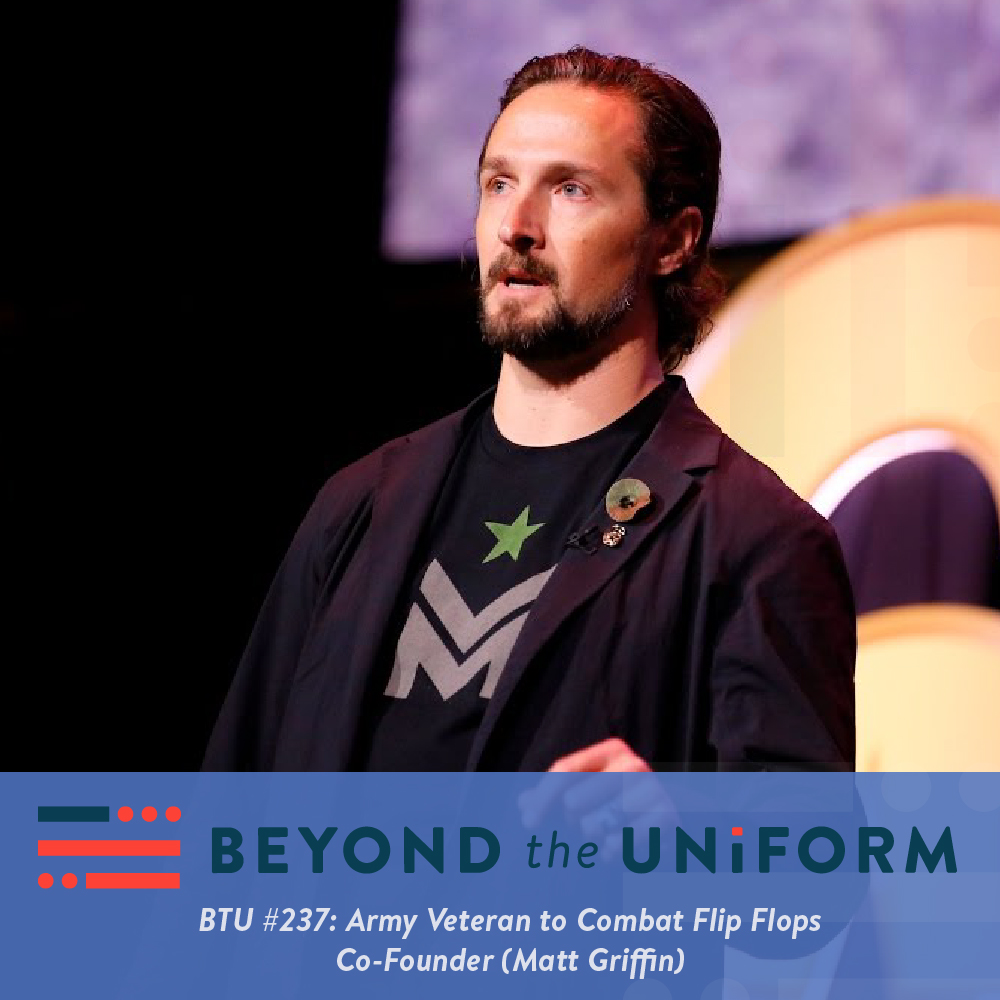






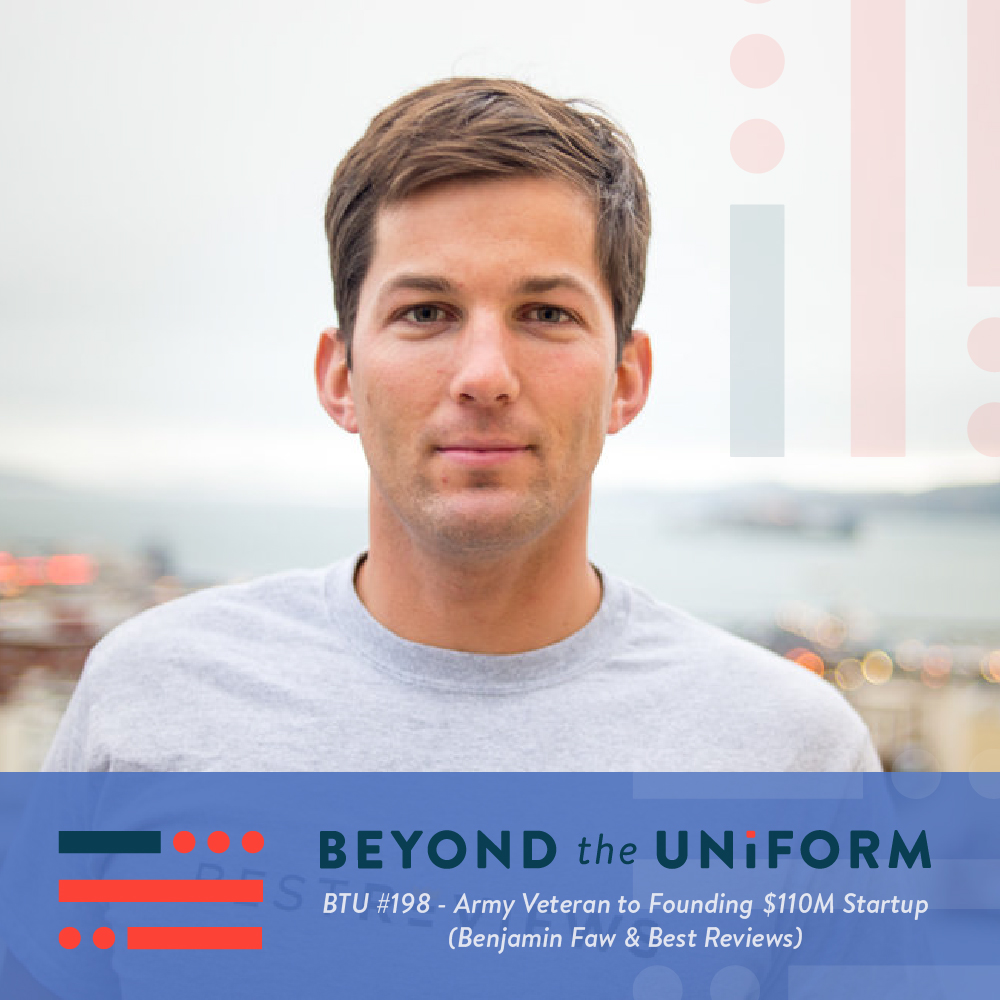

















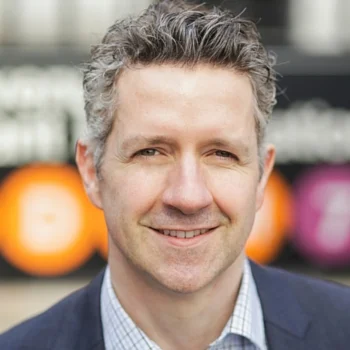




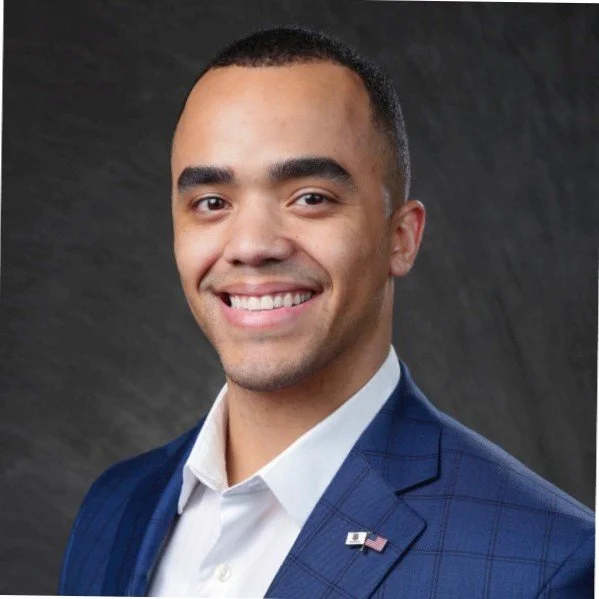










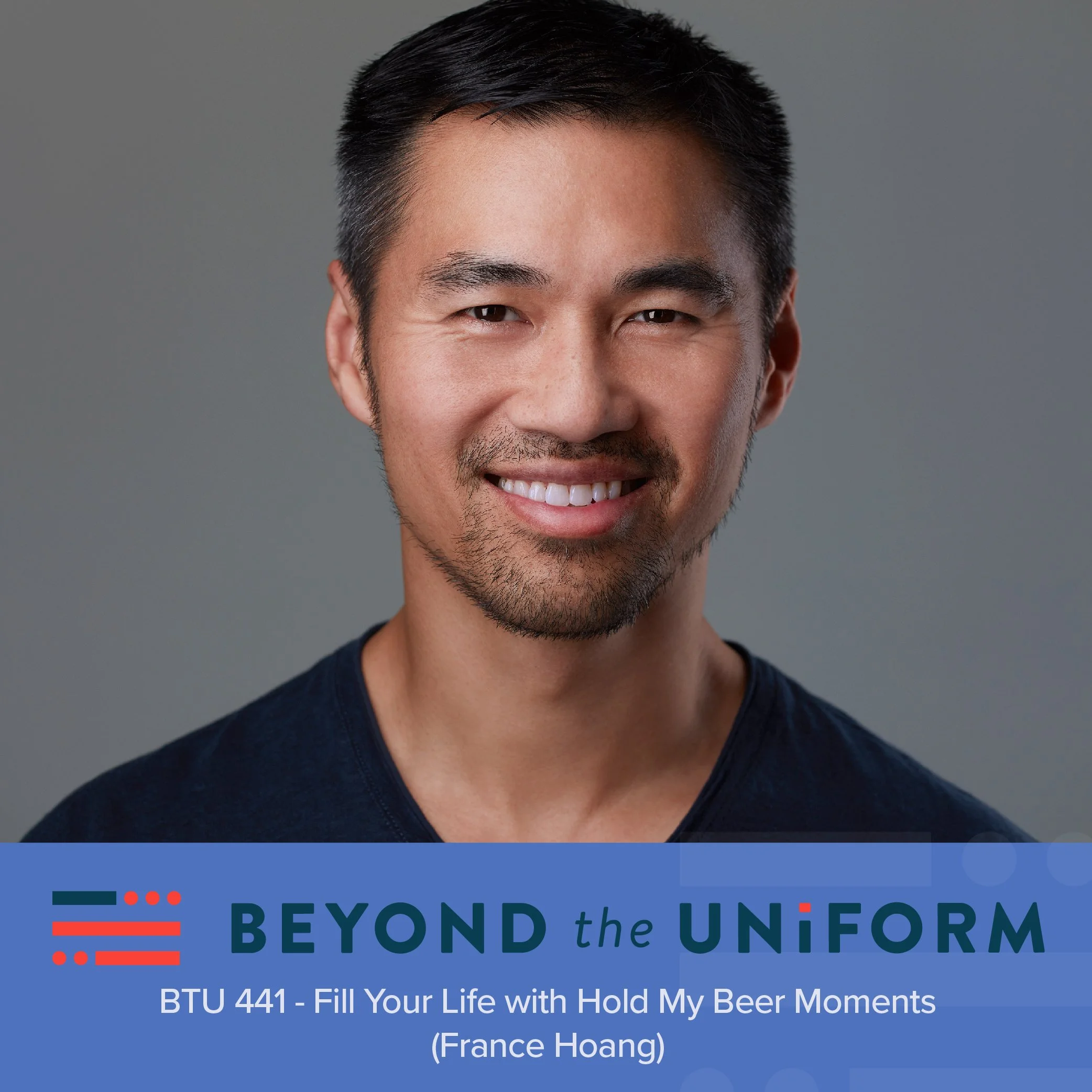







Rob is the Co-Founder and COO of ZeroEyes, an AI weapons detection platform that helps identify threats at first sight. In this interview we talk about:
>> WHY Rob has made it his mission to end mass shootings
>> How Rob has built a team that is ~60% military Veterans
>> How entrepreneurship is an alternating feeling of hiding under your desk, or jumping on top of your desk
>> What it's like to be COO of a quickly growing company